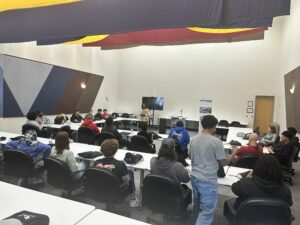
In recent years, there has been a significant shift in the world of technical education. More and more women are entering the field and making their mark as pioneers and leaders.
In a field where men have long held the majority position, they are breaking down barriers and questioning conventional gender roles. This transformation is bringing about a new era of innovation and progress in the field of technical training.
It is obvious that women are a powerful force shaping the future of technical education, as we see the rise of female-driven initiatives and institutions.
In this blog post, we will explore this shift in detail and highlight the remarkable achievements of women, including Dr. Joy Vann-Hamilton, who are at the forefront of this revolution.
A Historical Overview of Technical Education
Technical education has its roots deeply embedded in the industrial revolution, a period marked by significant technological advancements and the need for specialized skills to operate complex machinery.
Initially, technical training was informal, often passed down through apprenticeships, where experienced craftsmen would teach the younger generation their trade. However, the rise of industrialization necessitated a more structured approach to technical education.
By the late 19th and early 20th centuries, technical schools began to emerge, providing formal education in engineering, mechanics, and other applied sciences. These institutions were primarily designed to meet the demands of a growing industrial society, focusing on practical skills over theoretical knowledge.
For much of its history, technical education was seen as a male-dominated field, reflecting broader societal views on gender roles and employment. Women’s participation was limited, often relegated to less technical, more domestic skills training.
However, the landscape of technical education began to change in the latter half of the 20th century as societal attitudes shifted, leading to a more inclusive approach that welcomed participants from diverse backgrounds, including women, who have since played a pivotal role in shaping the future of technical training.
Breaking Barriers: The Emergence of Women in Technical Fields
The transition of women into technical fields represents a monumental shift in both societal norms and the dynamics of the technical education landscape.
As the barriers of gender stereotypes began to crumble, more women saw the potential for careers in engineering, computer science, and other technical professions. This emergence was not an overnight phenomenon but the result of decades of advocacy, policy changes, and the undeniable competence of women who ventured into these sectors.
Early adopters faced significant challenges, from limited access to education and resources to overcoming biases in the workplace. Yet, their resilience and success set a precedent, inspiring a new generation of women to pursue technical education and careers.
Initiatives aimed at encouraging female participation, such as scholarships, mentorship programs, and inclusive curriculums, have further facilitated this shift.These efforts not only diversified the technical workforce but also enriched the field with fresh perspectives and innovative solutions. As women continue to carve their niche in technical fields, they redefine the narrative, proving that technical acumen knows no gender.
Dr. Joy: A Pioneer in Technical Education

Dr. Joy Vann-Hamilton, an “edupreneur” stands at the forefront of revolutionizing technical education, establishing the nation’s first African-American- and woman-owned, non-profit career and technical school, RW2 Career and Technical Education.
Her journey, rich with diverse experiences—from her impactful work at the University of Notre Dame to her regional academic dean role in the for-profit technical education sector, and as a national educational consultant with the PEAR Institute of Harvard University—has culminated in her pioneering efforts with RW2.
Dr. Joy’s vision was to transcend traditional models by integrating industry professionals as educators, bringing invaluable real-world experience into the classroom.
This innovative approach not only aims to equip students with practical skills but also focuses on minimizing the financial burden of education, ensuring students graduate with valuable certifications without the weight of debt.
Additionally, RW2 places a strong emphasis on personal resilience as a core component of its teaching and learning philosophy.
Dr. Joy’s selection for the National Association of Career and Technical Education’s Next Level Fellows Leadership Program underscores her leadership and commitment to advancing technical education, making her a true beacon of change and inspiration in the field.
How to Support and Encourage Female Participation in Technical Education
Encouraging female participation in technical education is vital for the continued growth and diversity of the field.
RW2, under the pioneering leadership of Dr. Joy Vann-Hamilton, offers an exemplary model with its three programs: Computer-Aided Drafting and Design (CADD), Revit for Building Information Modeling (BIM), and Cybersecurity.
Recognized as one of the nation’s premier technical skills education, training, and certification programs, RW2 is perfectly positioned for individuals eager to embark on a new career, shift career paths, or enhance their current skill set.
Importantly, the program is designed with flexibility in mind, offering support to mothers and women who need to balance education with childcare or work commitments.
For those seeking career advancement in high-demand sectors of the technically skilled workforce without the necessity of a traditional degree, an RW2 education could be the key to unlocking potential.
The curriculum not only focuses on imparting critical technical skills but also emphasizes success through resilience in both life and work.
Conclusion: The Unstoppable Rise of Women in Technical Education
Women have pushed for considerable change by breaking the glass ceiling and establishing a strong presence in a traditionally male-dominated industry. The growth of technical education exemplifies this.
Their pioneering efforts, resilience, and innovative spirit have not only diversified the workforce but also enriched the technical field with groundbreaking perspectives and solutions.
As we continue to support and celebrate female role models like Dr. Joy Vann-Hamilton, the impact of their contributions will only amplify, paving the way for a more inclusive and equitable future in technical education.
The journey of women in technical fields is far from over; it’s an ongoing narrative of empowerment, growth, and breaking new ground.
Are you ready to be part of this transformative journey? Enroll in RW2‘s innovative programs today. Classes for Computer-Aided Drafting and Design (CADD) and Revit for Building Information Modeling (BIM) start on March 18, 2024, and for Cybersecurity on April 22, 2024.
Don’t miss this opportunity to advance your career with top-tier technical education and training. Join us, and let’s shape the future together.



